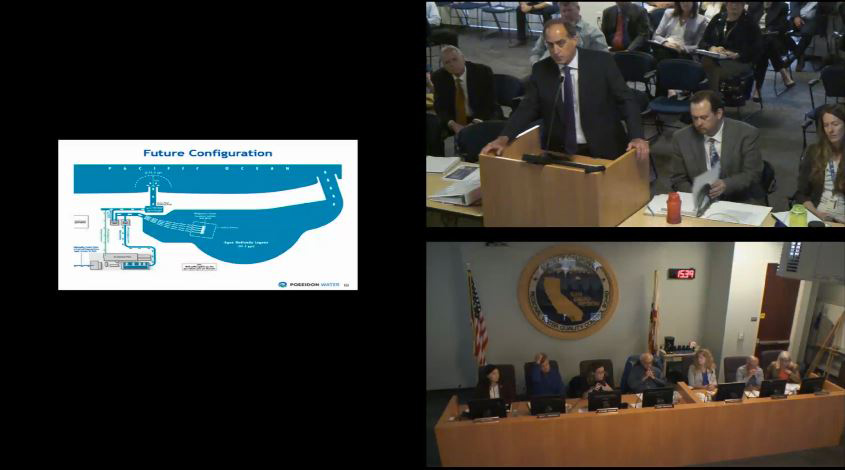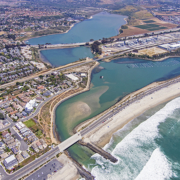San Diego regional water quality regulators today issued a permit for the installation of new, technologically advanced and environmentally sensitive seawater intake and discharge facilities at the Claude “Bud” Lewis Carlsbad Desalination Plant.
The plant – and the new permit – support Gov. Gavin Newsom’s April 29 executive order for California “to think differently and act boldly by developing a comprehensive strategy to build a climate-resilient water system.”
Under the new National Pollution Discharge Elimination System (NPDES) permit, the Carlsbad plant will continue producing about 50 million gallons a day of high-quality, drought-proof drinking water for the region as Poseidon Water and the San Diego County Water Authority develop a permanent, stand-alone seawater intake and associated structures.
Environmentally sensitive facility
The new intake-discharge system is needed for long-term operations of the nation’s largest seawater desalination plant, which started commercial production in December 2015 using water withdrawn from Agua Hedionda Lagoon for once-through cooling at the Encina Power Station. So far, it has produced more than 46 billion gallons of drinking water with reverse osmosis technology.
“The Carlsbad Desalination Plant is an invaluable asset for the state and region that helps us adapt to the changing climate and sustain a $231 billion regional economy,” said Jim Madaffer, chair of the Water Authority’s Board of Directors. “It is the most environmentally sensitive and technologically advanced plant of its kind in the nation – part of our commitment to collaborative projects and integrated water solutions for San Diego and the Southwest.”
Water supply sustainability
The closure of the power station in December 2018 led to temporary intake-discharge operations that will continue while new, stand-alone desal intake-discharge facilities are built. Conversion to stand-alone operations was anticipated in the 2012 Water Purchase Agreement between Poseidon, which owns and operates the desalination plant, and the Water Authority, which purchases the water for regional use. Currently, the plant provides about 10 percent of the region’s water supply.
“We are very thankful to the Regional Board for supporting the environmental enhancements of the Carlsbad project and water supply reliability for San Diego County,” said Poseidon CEO Carlos Riva. “This plant will continue to be a vital regional resource for decades to come and an example of how environmental stewardship can go hand-in-hand with water supply sustainability.”

Peter MacLaggan, senior vice president of project development with Poseidon Water, describes the water quality improvement at the Carlsbad Desalination Plant during a regional water quality control board public hearing in San Diego on May 8, 2019.
Transition in three phases
With the permit in hand, the transition to the new intake and discharge facilities will be implemented in three phases:
- Temporary Operations – NRG, which owns Encina Power Station, continues to operate the water circulation pumps while an interim intake system is constructed.
- Interim Operations – Expected to begin in mid-2020, this phase uses new fish-friendly pumps as a replacement for the existing circulation pumps. A new, permanent screened intake system also will be designed and built in the lagoon during this phase of operation. The new intake will rely on innovative technology, including 1 mm screens that will further enhance marine life protection.
- Permanent Operations – The new submerged, screened-intake system is expected to be connected in late 2023, achieving the best available technology to minimize impacts to marine life in full compliance with the 2015 California Ocean Plan Amendment.
Once permanent operations begin, the Carlsbad Desalination Plant will be the first to comply with the 2015 Ocean Plan Amendment, designed to advance ocean water as a reliable supplement to traditional water supplies while protecting marine life and water quality.
Environmental stewardship
Poseidon is also protecting the coastal environment by taking over responsibility for the preservation of Agua Hedionda Lagoon from NRG. As the lagoon’s steward, Poseidon Water is taking responsibility for ensuring the man-made lagoon continues to realize the life-sustaining benefits of an open connection to the Pacific Ocean through periodic maintenance dredging.
Dredging keeps sand from blocking the flow of ocean water in and out of the lagoon, maintaining its tidal circulation, which is needed to maintain a healthy marine ecosystem, support extensive recreational uses, sustainable aquaculture at Carlsbad Aquafarm, and a white seabass hatchery operated by Hubbs-SeaWorld. Dredging also helps replenish the sand on Carlsbad State Beach, which otherwise would revert to historical cobble-stone, with sand that is relocated from the lagoon to nearby shoreline.
Temporary operations are anticipated to cost about $6.5 million annually, increasing the cost of water from the plant in 2020 by about $135 per acre-foot. Permanent facilities are projected to cost between $66 million and $83 million. The Water Authority is seeking state grant funds to defray some of that cost.
The Water Authority purchases up to 56,000 acre-feet of water from the Carlsbad plant per year – enough to serve approximately 400,000 people annually. The plant is a major component of the Water Authority’s multi-decade strategy to diversify the county’s water supply portfolio and minimize vulnerability to drought or other water supply emergencies.




